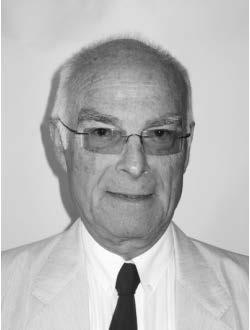
Born Etterbeek 20/11/1936, Deceased Haifa, Israel 16/03/2025
Samuel Wajc obtained his doctor in applied sciences degree at our sister
university the ULB (1965) on the dynamics and control of distillation
systems. He then spent a year as a postdoc in the Chemical Engineering
Department at Stanford University with one of the fathers of modern
chemical engineering, Prof. Andreas Acrivos. There he acquired the skills
and advanced mathematics tools for the first-principles modeling of flow,
heat and mass transfer in chemical engineering systems. This
fundamental approach to analyze and optimize complex processes
remains the common denominator in the department today.
He then joined the newly created Faculty of Engineering at the VUB where
his teaching duties included thermodynamics and heat transfer to all
engineering students and more specialized courses on unit operations,
separation and chemical reactor design. Happy to attack any challenging
industrial or environmental problem coming up, his research topics
included among others: horizontal distillation, water desalination with
membranes, concentrating solar collectors, a portable solar cooker, heat
recovery in greenhouses, a variety of water treatment problems, gelatine
drying, modeling of the heat release in the Scheldt estuary of the Doel
nuclear plants and wastewater release in the Mediterranean Sea.
In the mid 70's, he was asked as a consultant for a tough water
treatment problem from aluminum anodization. It quickly appeared that a
traditional aerobic plant was inappropriate to eliminate essentially two
concentrated streams of NaOH and sulphuric acid heavily contaminated
with aluminum. Digging deep into the chemistry of these processes, he
again worked himself in the lab and came up with a process to transform
these waste streams in high value sodium aluminate, took a patent
(1978) and started his spinoff company to successfully commercialize this
process, which became his main activity for the next decade.
With this newly acquired knowhow in inorganic chemistry, he took a oneyear
sabbatical in 1985 and joined the Israel Chemicals research center.
He resumed his position as head of the department until 1988 when he
decided on a radical career switch and moved to Israel to implement his
ideas in industry and rejoined Israel Chemicals, the company that runs
the Dead Sea Works, phosphate mines and a wide variety of inorganic
and organic chemicals production (e.g. lactic acid) until his retirement. He
however remained active as a consultant for water treatment practically
until his death.
From 1992 to 1995 he reconnected with the ULB and became a part time
professor for the chemical engineering courses and there developed a
multifunctional catalytic reactor suitable for the exothermal synthesis of
condensable products. He also taught in the Chemical Engineering
Department at the Technion for a brief period.
He had a special fascination for the natural phenomena in the Dead Sea
evaporation pans and always had stories and theories about the subject.
As a foreign member of the Royal Belgian Academy, section Technology
and Society, he published a small volume on the subject: And what would
you do with the Dead Sea? (2015)
Not only an excellent engineer, teacher and mentor for his students and
collaborators, Prof. Wajc was above all a creative innovator, a real
inventor, bursting with ideas which he gladly shared with others. He
adored walking into someone's office, asking what they were working on
and then without hesitation start a discussion and spitting out ideas, even
in subjects he was not familiar with, pushing his interlocutors to think out
of the box. His inspiration for that approach invariably relied on his
encyclopedic knowledge in many fields. That methodology remains
imprinted in the Chemical Engineering Department of which he was the
founding father. We are eternally indebted to him.
